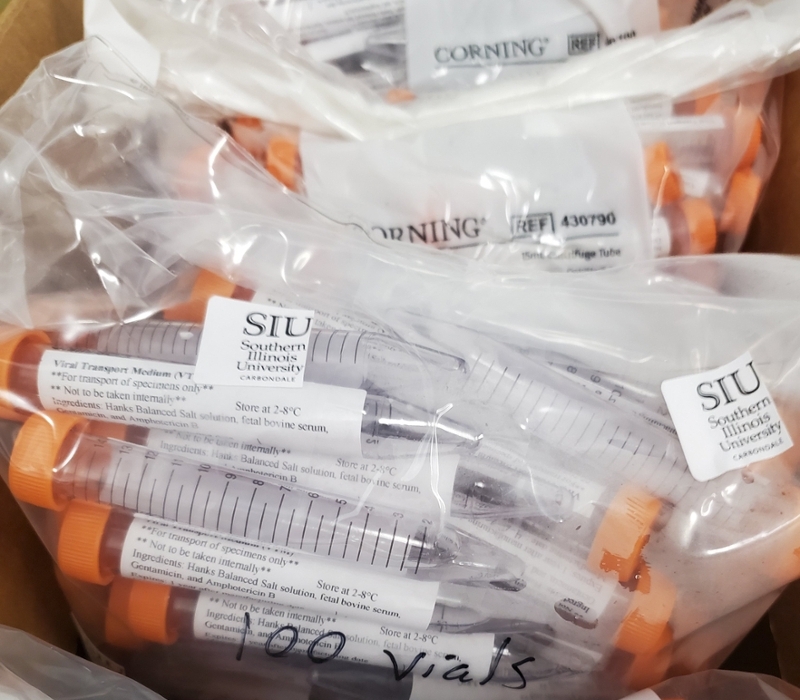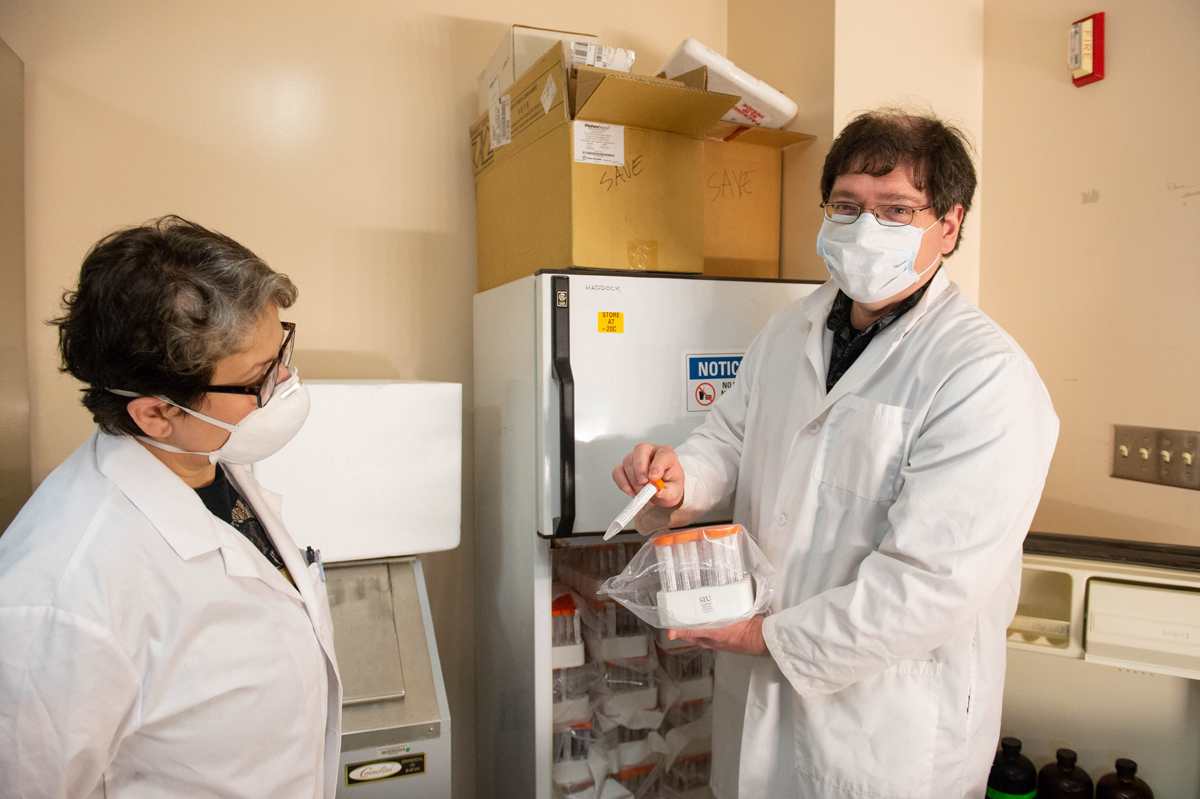
The first batch of 100 vials containing Viral Transport Medium sits in a SIU laboratory Tuesday afternoon. The mixture a critical component of COVID-19 tests. The mixture is in short supply and SIU faculty are helping make up the shortfall. (Photo provided)
April 08, 2020
SIU faculty join statewide effort to manufacture critical COVID-19 test ingredient
CARBONDALE, Ill. -- Testing individuals for COVID-19 is a major part of the ongoing effort to control the virus’ spread, and faculty at Southern Illinois University Carbondale are stepping forward to provide a key ingredient needed for the tests.
Matt Geisler, Vjollca Konjufca and Scott Hamilton-Brehm, all faculty in the School of Biological Sciences at SIU, are spearheading an effort to manufacture Viral Transport Medium, a mixture that maintains the genetic information of a virus until it can be tested. Faculty have been working around the clock organizing the effort, identifying vendors and gathering needed lab supplies to begin production this week.
VTM shortage slows testing
The substance plays a critical role in testing individuals for COVID-19, as medical personnel place swabs from suspected cases in vials containing the solution before capping, sealing and sending them to testing facilities. But the sudden need for testing on such a large scale made for a dwindling supply statewide and across the nation.
As the magnitude of the ongoing health emergency became apparent, state officials put out a call to universities for faculty to manufacture the critical substance. SIU researchers, along with several other state universities, stepped forward. Faculty last week began collecting ingredients for the mixture, which includes a simple salt, fetal bovine serum, gentamicin and antifungal substances.
Getting the virus to the lab
“Viral transport medium is designed to keep virus samples viable to testing over long periods of time,” said Hamilton-Brehm, assistant professor in microbiology. “This is not to be confused with keeping the virus alive; it is not meant to do that. Instead it keeps the virus’ genetic information accessible so that it can be tested.”
VTM is a pH buffered fluid with a specific formulation of different salts, a protein coating to prevent the virus from sticking to the tube, and other chemicals to prevent the virus and its RNA from breaking down. Geisler, associate professor of mathematical biology, said his work in fungal plant disease means his lab normally keeps similar storage and transport solutions handy.
“But we are able to make VTM with a little tweaking,” he said. “More importantly, this work needs to be done in a biosafety hood to prevent contamination. To make it requires an autoclave for the salts, filter sterilization for the more heat sensitive chemicals, and lab technicians and supervisors trained in sterile transfer technique.”
Playing a major role
Another immediate challenge is scaling up lab-sized batches to the large quantities needed as soon as possible. SIU is hoping to produce up to 30 liters per week – enough for 10,000 test vials. Such a contribution would equate to roughly 30 percent of the VTM used by the state.
“It’s a testament to the commitment of our faculty to help the state respond to the needs of the citizens of Illinois,” said Gary Kinsel, vice chancellor for research.
Scaling up production
For the researchers, it means collecting ingredients in bulk and carefully calculating the orders-of-magnitude increases of those various ingredients in the “recipe” for larger batches, Hamilton-Brehm said.
“SIU is not normally set up to do this. For research purposes, we usually only use a few liters of any media in the lab,” he said. “In this case, we are bolstering the whole state of Illinois and beyond. So we are buying our starting reagents in bulk, and we’re converting our laboratories from personal research to produce what is needed.”
Truly a team effort
Hamilton-Brehm and senior graduate students Trevor Murphy and Erik Velkme will comprise the initial production team, while Konjufca, associate professor of microbiology, acts as the team’s expert virologist while also assisting with production. Geisler will play the role of lead troubleshooter, helping coordinate and mobilize faculty while overcoming bottlenecks when they appear.
The overall effort, however, cuts across multiple schools and disciplines at SIU and even the Carbondale community itself.
Andrew Wood, professor of plant biology and director of the School of Biological Sciences, is coordinating the overall effort. Buffy Ellsworth, associate professor of physiology in the SIU School of Medicine, and Laxmi Sagwan-Barkdoll, a research education specialist in the School of Biological Sciences, are contributing and donating supplies to the effort, while Buck Hales, professor of physiology, and Karen Hales, assistant professor of obstetrics and gynecology, both of the SIU School of Medicine, are preparing stocks of supplies from the labs for donation to the cause.
The local Staples store is printing vitally needed labels for testing vials and other items, which will help keep faculty safe and organized during the process.
“Our faculty, as individuals, are strong in our own ways, but together, unified behind a common goal, we can move heaven and earth,” Hamilton-Brehm said.
Answering the call for public service
The state’s call for supplementing stockpiles of critically short materials especially targeted universities with strong biology, biochemistry, physiology and laboratory training and research programs, Geisler said.
“I am glad that our faculty have answered the call, and in the last few days, I have gotten a lot of different departments and schools within SIU volunteering supplies, offering to help and generally being very supportive of our effort,” he said.
Hamilton-Brehm said the ongoing effort is part of the war on the virus, and SIU faculty were pleased to be able to do their part.
“My uncles and cousins fought in World War II. This is not like the war they fought in, but my skills as a microbiologist put my colleagues and me in a unique situation where we can contribute in a very meaningful way,” he said. “Making a media recipe is mundane and something we do all the time, but in this situation, it will help contain the virus so that it cannot hide anymore. When the virus cannot hide, we will be able to be near our loved ones again.”

Vjollca Konjufca, associate professor of microbiology, left, and Scott Hamilton-Brehm, assistant professor of microbiology, work in a laboratory at Southern Illinois University Carbondale making Viral Transport Medium, a critical component of COVID-19 tests. The mixture is in short supply and SIU faculty are helping make up the shortfall. (Photo by Yenitza Melgoza)
